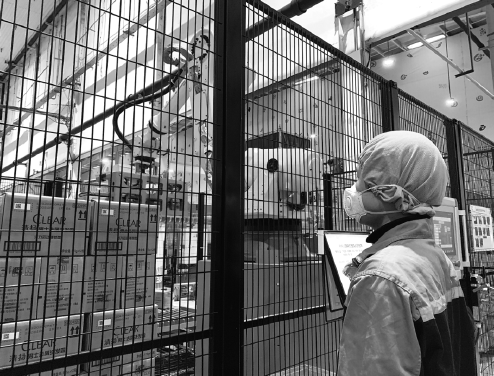Unilever to open new production unit in Guangzhou

A Unilever employee works at a smart production facility in Hefei, Anhui province. CHINA DAILY
Consumer goods company Unilever China announced it would establish its new South China integrated manufacturing site in Guangzhou, Guangdong province, as construction of the factory will start at the end of this year and the facility is expected to start operations in 2023.
Unilever said it would invest 130 million euros ($150.8 million) in the building of the first phase of the Guangzhou plant. Upon completion, the factory will cover the production of food, personal care and home care products.
Located in Guangzhou's Conghua district, the plant is expected to raise the comprehensive supply chain capability of Unilever in China. The factory aims to become a new hallmark of smart manufacturing in China among traditional sectors.
"This project is the largest investment by Unilever in China in recent years. We have full confidence in the Chinese market and have a long-term commitment to China," said Rohit Jawa, president of Unilever North Asia.
"China is one of the top three key growth markets for Unilever globally. We will continue to drive Unilever's consistent growth in China with our purpose-led, future-fit business model, and we are committed to making sustainable living commonplace," he said.
Jawa, who has been working in Shanghai since 2017, was honored in September with the Shanghai Magnolia Silver Award for his outstanding contribution to Shanghai's economic and social development and foreign exchange and cooperation.
Since the second quarter of last year, Unilever's business in China has rebounded strongly and posted significant growth, as the COVID-19 pandemic was brought under better control in China.
Unilever China has established seven manufacturing bases nationwide. They are located in the Yangtze River Delta region, the Beijing-Tianjin-Hebei region, and western China. The latest site in Guangzhou will serve as another large-scale comprehensive factory after the company's plants in Hefei, Anhui province, Tianjin, and Meishan, Sichuan province.
Unilever said it aims to utilize the geographic advantage of Guangdong.
Located in the Guangdong-Hong Kong-Macao Greater Bay Area, one of the most dynamic regions in China that has achieved high levels of opening-up, the plant in Guangdong will serve as an export base for Unilever China, and provide products for markets under the Regional Comprehensive Economic Partnership, and other overseas markets.
"Guangdong has an industrial cluster of plants that produce household products. By setting up a new factory in Guangzhou, Unilever will be able to rely on the advantages of manufacturing clusters in the Bay Area and strengthen the coordination of upstream and downstream supply chains," said Zheng Wanying, an analyst at LeadLeo Research Institute, a market research provider.
"Besides, by taking advantage of the development of intelligent logistics infrastructure in the Bay Area, Unilever can further speed up its products circulation and lower logistics costs," she said.
The designers of Unilever's Guangzhou factory considered green development from the beginning, with the aim of enabling the factory to help support carbon neutrality. Unilever has made a commitment to achieve net zero emissions from sourcing to sales by 2039. The company will make full use of Conghua district's renewable energy resources including solar energy and hydropower to develop a circular economy.
In addition, the factory is expected to be highly digitalized and automated while also creating local job opportunities. The operation of the factory requires staff members who are skilled at working with digitalized machines.
"We will help workers to raise their professional skills. They are going to shift from traditional labor-intensive work previously to positions that require more professional and technical abilities, and thus meet the demand of company's digitalization upgrade and development," Jawa said.
The establishment of this facility in Guangzhou shows Unilever's recognition of the city's business environment. Guangzhou will take the opportunity to build the city into an international consumption center and attract more high-end resources, said Hong Qian, director of the Guangzhou Municipal Commerce Bureau.
Meanwhile, Unilever's food production base in Taicang, Jiangsu province, has been selected as a "lighthouse factory", becoming the first such factory in the ice cream sector globally.
Lighthouses refer to leading-edge manufacturing sites that show the way for sustainable and profitable growth, as recognized by a global initiative launched by the World Economic Forum and consultancy McKinsey in 2018.



 Print
Print Mail
Mail

